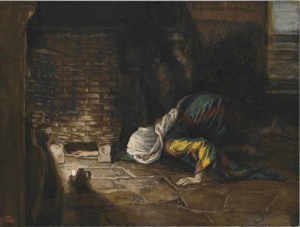Thoughts on Today’s Lessons for Sept. 11, 2016

Parable of the Lost Coin, oil painting by James J. Tissot (French painter and illustrator, 1836-1902)
Last week’s reading from Jeremiah showed us a cosmic potter breaking an unsatisfactory vessel and starting it over, an image of God’s anguish over a chosen people gone badly wrong. Now we page back in the prophet’s book to find a righteously angry God who might remind us of a loving parent brought to rope’s end by misbehaving children. “My people are foolish … they are stupid children … they have no understanding.” God’s anger, the prophet warns the people, can have deadly consequences.
First Reading (Track Two): Exodus 32:7-14
When Moses was high up on the cloudy top of Mount Sinai, the people below were afraid, so they created and worshiped an idol, a golden calf. As today’s reading begins, we see a righteously angry God, who is prepared to kill all the people and start over again, making a new nation not from the descendants of Abraham but those who will descend from Moses. But when Moses pushes back, recalling God’s covenant with Abraham’s family and their long journey out of Egypt, God shows mercy and relents.
Today’s Psalm clearly echoes Jeremiah’s vision of God’s impatient anger with a troublesome people. Jeremiah’s angry words about stupidity and foolishness are repeated in the Psalmist’s scorn for fools, corrupt people and doers of abominable deeds. Yet at the end, the Psalm gives hope: God will ultimately restore their fortunes amid gladness and rejoicing.
Psalm (Track Two): Psalm 51: 1-10
Today’s Psalm imagines the guilt and shame of King David, who had sent his loyal soldier Uriah to certain death in battle in order to cover up David’s adulterous affair with Uriah’s wife, Bathsheba. This Psalm imagines David’s repentant cry after the prophet Nathan shocked the king into recognizing his great sin.
Second Reading: 1 Timothy 1:12-17
The two short letters to Timothy near the end of the New Testament are understood as letters of pastoral advice. Scholars nowadays recognize them as having been written in Paul’s name generations later, in a second-century time when the early church was becoming more institutionalized and conservative. Nevertheless, today’s reading seems fully consistent with the original Paul’s love of Jesus as our savior who offers us eternal life.
Gospel: Luke 15:1-10
Luke’s gospel makes us think, with two short parables that liken God’s care for “sinners” to people who lose important things – a sheep from a flock, and a silver coin. The search for each lost item is intent and fierce. When the objects are found, the abundant joy of thanksgiving seems almost over the top considering the size of the loss … until we measure it in love. Turn the page at the end of this reading and we find yet another familiar story of loss, recovery and celebration: The Prodigal Son.
